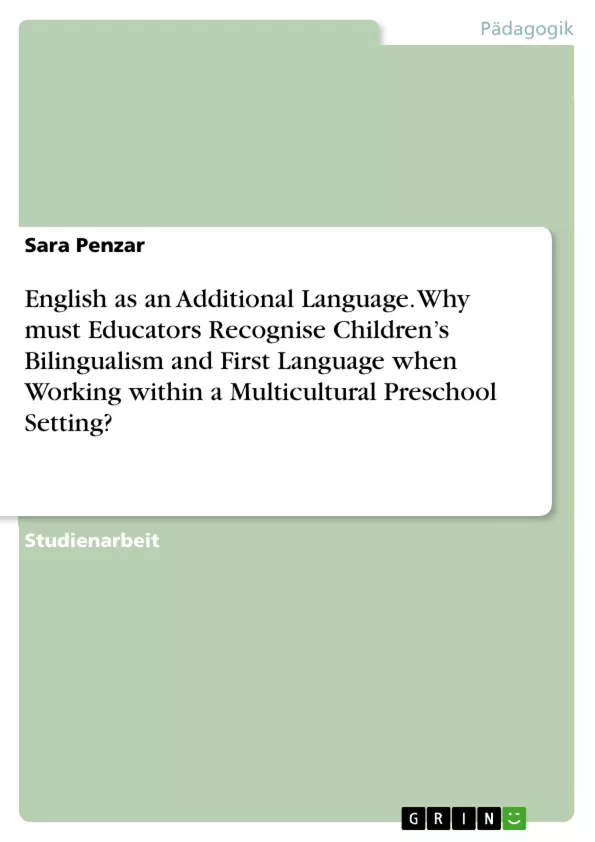It seems that young children learning English as an Additional Language (EAL) are often expected to acquire English rapidly and naturally, without any further help. It appears that many settings do not give the role of the child’s first language enough significance. Consequently we could argue, that their language learning needs are frequently being overlooked within the early-years sector.
This paper focuses on the aspects that need to be considered by practitioners in order to convey the importance of adequate language assessment and support for EAL learners within the UK’s early-years education sector and beyond.
Inhaltsverzeichnis
- Introduction
- The difficulty with EYFS Assessments for children with EAL
- The creation of positive learning environments
Zielsetzung und Themenschwerpunkte
Diese Arbeit beleuchtet die Notwendigkeit, dass Erzieher die Zweisprachigkeit und die Erstsprache von Kindern erkennen, wenn sie in einer multikulturellen Vorschule arbeiten. Sie untersucht die Herausforderungen bei der Bewertung der Sprachentwicklung von Kindern, die Englisch als Zweitsprache (EAL) lernen, im Rahmen des Early Years Foundation Stage (EYFS) in Großbritannien. Die Arbeit befasst sich mit den Auswirkungen des EYFS-Bewertungssystems auf Kinder mit EAL und betont die Bedeutung der Berücksichtigung der Erstsprache des Kindes. Darüber hinaus werden positive Lernumgebungen für EAL-Kinder untersucht und verschiedene Ansätze zur Unterstützung ihrer Sprachentwicklung vorgestellt.
- Die Herausforderungen bei der Bewertung der Sprachentwicklung von Kindern mit EAL im Rahmen des EYFS
- Die Bedeutung der Berücksichtigung der Erstsprache des Kindes bei der Sprachentwicklungsbewertung
- Die Schaffung positiver Lernumgebungen für EAL-Kinder
- Die Bedeutung der Förderung der Zweisprachigkeit und der Anerkennung der Vorteile, die sie für Kinder bietet
- Praktische Strategien zur Unterstützung der Sprachentwicklung von EAL-Kindern in Vorschuleinrichtungen
Zusammenfassung der Kapitel
Das erste Kapitel führt in das Thema ein und stellt die Situation von Kindern mit EAL in Großbritannien vor. Es beleuchtet die Bedeutung der Sprachentwicklung im frühen Kindesalter und die Herausforderungen, die mit der Bewertung der Sprachentwicklung von Kindern mit EAL im Rahmen des EYFS verbunden sind.
Das zweite Kapitel analysiert die Schwierigkeiten, die mit der EYFS-Bewertung für Kinder mit EAL verbunden sind. Es stellt die Kritik an der ausschließlichen Fokussierung auf Englisch bei der Bewertung und die negativen Auswirkungen auf die Sprachentwicklung und das Selbstbild von Kindern mit EAL dar.
Das dritte Kapitel befasst sich mit der Schaffung positiver Lernumgebungen für EAL-Kinder. Es erörtert verschiedene Theorien der Spracherwerbs und betont die Bedeutung der Berücksichtigung der Zweisprachigkeit und der Bereitstellung von Möglichkeiten für Kinder, beide Sprachen zu nutzen.
Schlüsselwörter
Englisch als Zweitsprache (EAL), Zweisprachigkeit, Erstsprache, Early Years Foundation Stage (EYFS), Sprachentwicklungsbewertung, multikulturelle Vorschule, positive Lernumgebung, Sprachförderung, Interdependenz-Hypothese, Code-Switching, Sprachbeeinträchtigung.
Häufig gestellte Fragen
Warum ist die Erstsprache für Kinder mit EAL so wichtig?
Die Berücksichtigung der Erstsprache fördert das Selbstvertrauen und bildet die kognitive Basis für den erfolgreichen Erwerb des Englischen (Interdependenz-Hypothese).
Was sind die Probleme bei EYFS-Bewertungen für EAL-Lernende?
Das System fokussiert oft einseitig auf Englischkenntnisse, wodurch die tatsächlichen kognitiven und sprachlichen Fähigkeiten der Kinder unterschätzt werden.
Wie können Erzieher eine positive Lernumgebung schaffen?
Durch die Anerkennung von Zweisprachigkeit, die Einbeziehung kultureller Hintergründe und die Bereitstellung von Möglichkeiten zum Code-Switching.
Was ist die Interdependenz-Hypothese?
Sie besagt, dass Fähigkeiten in der Erstsprache auf die Zweitsprache übertragen werden können, sofern die Erstsprache ausreichend gefördert wird.
Welche Rolle spielt die multikulturelle Vorschule bei der Integration?
Sie fungiert als entscheidender Ort, an dem Vielfalt als Vorteil wahrgenommen und die Identitätsentwicklung zweisprachiger Kinder unterstützt wird.
- Quote paper
- Sara Penzar (Author), 2016, English as an Additional Language. Why must Educators Recognise Children’s Bilingualism and First Language when Working within a Multicultural Preschool Setting?, Munich, GRIN Verlag, https://www.grin.com/document/343626



